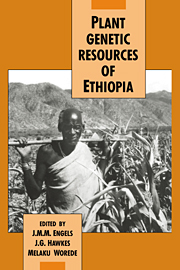Book contents
- Frontmatter
- Contents
- Contributors
- List of acronyms
- Preface
- Part I General introduction
- Part II The Ethiopian centre of diversity
- 2 The Ethiopian gene centre and its genetic diversity
- 3 Crops with wild relatives found in Ethiopia
- 4 Diversity of the Ethiopian flora
- 5 Forest genetic resources of Ethiopia
- 6 Plants as a primary source of drugs in the traditional health practices of Ethiopia
- 7 Traditional aromatic and perfume plants in central Ethiopia (a botanical and ethno-historical survey)
- 8 Spice germplasm in Ethiopia
- 9 A diversity study in Ethiopian barley
- 10 Sorghum history in relation to Ethiopia
- 11 Prehistoric Ethiopia and India: contacts through sorghum and millet genetic resources
- 12 Konso agriculture and its plant genetic resources
- Part III Germplasm collection and conservation in Ethiopia
- Part IV Evaluation and utilization of Ethiopian genetic resources
- Index
6 - Plants as a primary source of drugs in the traditional health practices of Ethiopia
Published online by Cambridge University Press: 30 October 2009
- Frontmatter
- Contents
- Contributors
- List of acronyms
- Preface
- Part I General introduction
- Part II The Ethiopian centre of diversity
- 2 The Ethiopian gene centre and its genetic diversity
- 3 Crops with wild relatives found in Ethiopia
- 4 Diversity of the Ethiopian flora
- 5 Forest genetic resources of Ethiopia
- 6 Plants as a primary source of drugs in the traditional health practices of Ethiopia
- 7 Traditional aromatic and perfume plants in central Ethiopia (a botanical and ethno-historical survey)
- 8 Spice germplasm in Ethiopia
- 9 A diversity study in Ethiopian barley
- 10 Sorghum history in relation to Ethiopia
- 11 Prehistoric Ethiopia and India: contacts through sorghum and millet genetic resources
- 12 Konso agriculture and its plant genetic resources
- Part III Germplasm collection and conservation in Ethiopia
- Part IV Evaluation and utilization of Ethiopian genetic resources
- Index
Summary
Introduction
The maintenance of health by means of various techniques and substances is almost as old as the history of human evolution itself. Although the resources available were easily drawn from the natural environment, their efficacy for solving problems which reduce life expectancy was established only through rigorous trials over a considerable period of time, often involving Man himself as subject of the experiment.
Our ancestors, and millions of people in modern Africa, have relied heavily on plants, animals and minerals to ward off pathogens and to maintain the functional balance of each organ. Many species of plants had to be tested and retested in the endless search for drugs that could prolong life or, it was believed, even confer immortality. Many plants have been found to possess the desired effects as a result of well planned experiments, while some discoveries were just a product of serendipity. Many sacrifices had to be made, however, not only in terms of money and time, but also in terms of human lives.
Until a generation or two ago plants were the primary source of health care for entire populations in most African countries and such plants still remain important sources of drugs for nearly 80 per cent of the population in contemporary Ethiopia. In spite of this we still know very little, whilst many Africans who receive their education abroad believe that imported drugs are always superior, even if these are unaffordable to the large majority of the population.
- Type
- Chapter
- Information
- Plant Genetic Resources of Ethiopia , pp. 101 - 113Publisher: Cambridge University PressPrint publication year: 1991
- 16
- Cited by



